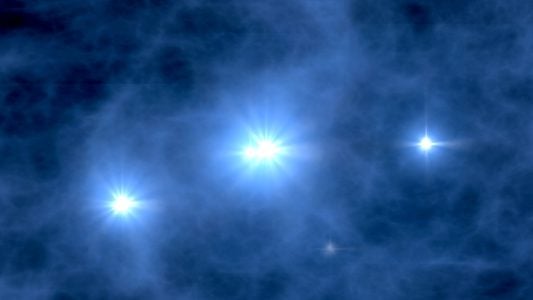
(Wikimedia Commons public domain image)
Why is there anything at all?
Either the universe — by which, in this instance, I intend the ensemble, the totality, of all that exists — has always existed in some form or another, a simple brute fact that requires and admits of no explanation, or it came into existence. The cosmological theory of the “Big Bang,” overwhelmingly dominant in recent decades, suggests that the universe that we know began to exist approximately 13.8 billion years ago.
There seem to be two options here: Either nothing caused the known universe to exist or something cause the known universe to exist.
With that in mind, the so-called Kalaam Cosmological Argument — which draws its name from its origin among medieval Arab Muslim philosophers — comes into play. One of its foremost contemporary advocates, the evangelical Protestant philosopher William Lane Craig, typically lays it out in a simple syllogism that runs along the following lines.
- Everything that begins to exist must have a cause.
- The universe began to exist.
- Therefore, the universe must have a cause.
Judaeo-Christian scripture has never hesitated to identify that cause:
“All things were made by him; and without him was not any thing made that was made.” (John 1:3)
“For by him were all things created, that are in heaven, and that are in earth, visible and invisible, whether they be thrones, or dominions, or principalities, or powers: all things were created by him, and for him: And he is before all things, and by him all things consist.” (Colossians 1:16)
(See also such passages as Genesis 1:1; Psalm 8:1-3; 19:1; 95:3-6; 115:15; Romans 11:36; 1 Corinthians 8:6; and Hebrews 1:2.)
But, scientifically speaking, the question is unresolved. Writing in Scientific American in 1994, the noted Stanford University physicist and cosmologist Andrei Linde wrote:
The first, and main, problem is the very existence of the big bang. One may wonder, What came before? If space-time did not exist then, how could everything appear from nothing? What arose first: the universe or the laws determining its evolution? Explaining the initial singularity — where and when it all began — still remains the most intractable problem of modern cosmology. (Andrei Linde, “The Self-Reproducing Inflationary Universe,” Scientific American 271 [November 1994], 48)
It was perhaps for that reason that Sir John Maddox (1925-2009), a British theoretical chemist turned physicist who served for a total of twenty-two years as the editor of Nature, one of the world’s most prestigious scientific journals, called the Big Bang theory “a view of the origin of the Universe [that] is thoroughly unsatisfactory” (John Maddox, “Down with the Big Bang,” Nature 340 [10 August 1989], 425).
Many, however, see the Big Bang and the fertile orderliness of the cosmos that has resulted from it as an indicator of the existence of God. For example, Richard Swinburne (b. 1934), a distinguished philosopher long associated with Oxford University, asks an important question and responds to it in the light of traditional mainstream philosophical theism:
Why believe that there is a God at all? My answer is that to suppose that there is a God explains why there is a world at all . . . and so much else. In fact, the hypothesis of the existence of God makes sense of the whole of our experience, and it does better than any other explanation which can be put forward, and that is the grounds for believing it to be true. (Richard Swinburne, in “Evidence for God,” 229-238, in Terry Miethe and and Richard Flew, ed., Does God Exist? [San Francisco: Harper, 1991], 229)
Arno Penzias, co-winner of the 1978 Nobel Prize for Physics and co-discoverer, with Robert Wilson, of the cosmic background radiation that confirmed the Big Bang theory, commented that
Astronomy leads us to a unique event, a universe which was created out of nothing, one with the very delicate balance needed to provide exactly the conditions required to permit life, and one which has an underlying (one might say ‘supernatural’) plan. (Arno Penzias, cited in Henry Margenau and Roy Abraham Varghese, eds., Cosmos, Bios, Theos: Scientists Reflect on Science, God, and the Origin of the Universe: Life and Homo Sapiens [LaSalle, IL: Open Court, 1992], 83.)
The late NASA scientist Robert Jastrow (1925-2008), who described himself as a religious agnostic over much of his life, remarked that
The essential elements in the astronomical and biblical accounts of Genesis are the same: the chain of events leading to man commenced suddenly and sharply at a definite moment in time, in a flash of light and energy. . . . For the scientist who has lived by his faith in the power of reason, the story ends like a bad dream. He has scaled the mountain of ignorance; he is about to conquer the highest peak; as he pulls himself over the final rock, he is greeted by a band of theologians who have been sitting there for centuries. (Robert Jastrow, God and the Astronomers, 1978)
However, as Jastrow also observed, there has been resistance to theistic readings of the Big Bang, and he didn’t hesitate to describe that resistance as being, in some cases, of a quasi-religious character:
There is a kind of religion in science. . . . The religious faith of the scientist is violated by the discovery that the world had a beginning under conditions in which the known laws of physics are not valid, and as a product of forces or circumstances we cannot discover. (Robert Jastrow, God and the Astronomers [New York: Norton, 1978], 113-114)
The geneticist and evolutionary biologist Richard Lewontin, now emeritus Alexander Agassiz Research Professor at Harvard, will serve to illustrate Jastrow’s point. He expressed himself in very striking terms in early 1997:
We take the side of science in spite of the patent absurdity of some of its constructs . . . because we have a prior commitment, a commitment to materialism. It is not that the methods and institutions of science somehow compel us to accept a material explanation of the phenomenal world, but, on the contrary, that we are forced by our a priori adherence to material causes . . . no matter how counter-intuitive, no matter how mystifying to the uninitiated. Moreover, that materialism is an absolute, for we cannot allow a Divine foot in the door. (Richard Lewontin, “Billions and Billions of Demons,” The New York Review [9 January 1997], 31.)
Scott Todd, an immunologist at Kansas State University at the time, put that position even more concisely in a 1999 letter to Nature:
Even if all the data point to an intelligent designer, such a hypothesis is excluded from science because it is not materialistic. (Nature 410 [6752]: 423 [30 September 1999])
Theists, however, have not surrendered. Responding to the admittedly dominant naturalistic worldview, the British theoretical physicist Sir John Polkinghorne, formerly president of Queen’s College, Cambridge, observes that there exists “a possible explanation of equal intellectual respectability — and to my mind, greater elegance.” It is “that this one world is the way it is because it is the creation of the will of a Creator who purposes that it should be so.” (John Polkinghorne, One World [SPCK, 1986], 79-80.)
***
Some miscellaneous science stuff:
“Could COVID-19 have wiped out the Neandertals?”
“Here’s how Vikings celebrated Christmas: They drank, and they ate horse meat.”
***
Finally, a friend has kindly called my attention to a website that he’s created and that I think could be very helpful to many:












